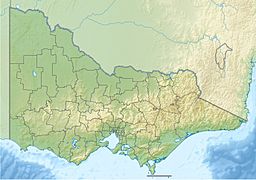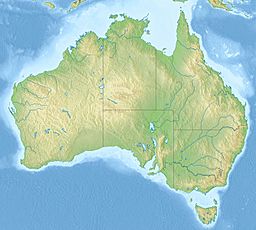Lake Condah facts for kids
Quick facts for kids Lake Condah(Tae Rak) |
|
|---|---|
| Location | Newer Volcanics Province, Victoria, Australia |
| Coordinates | 38°03′46.1″S 141°49′57.9″E / 38.062806°S 141.832750°E |
| Type | lake |
| Native name | Tae Rak Error {{native name checker}}: parameter value is malformed (help) |
Lake Condah, also known by its Gunditjmara name Tae Rak, is a special lake in Victoria, Australia. It is about 324 kilometers (201 miles) west of Melbourne. The lake is a shallow, flat area, about 4 kilometers (2.5 miles) long and 1 kilometer (0.6 miles) wide.
This lake is part of the Newer Volcanics Province. This area in western Victoria has Australia's youngest volcanoes. Lake Condah is near the Budj Bim (Mount Eccles) volcano. It is also within the Budj Bim Cultural Landscape, which became a World Heritage List site in 2019. This region is famous for its amazing ancient aquaculture systems. These systems were built by the local Gunditjmara people.
Contents
About Lake Condah
Lake Condah is a shallow lake, about 4 kilometers long and 1 kilometer wide. It is located near the town of Heywood. This area is known for its very old aquaculture systems. The Gunditjmara people built these systems over 6,600 years ago. They used them to catch short-finned eels (called kooyang) and other fish.
How Lake Condah Was Formed
Lake Condah was likely created by lava flows. These flows happened during or after an eruption of the Budj Bim volcano. It is not a crater lake, but a shallow area on a plain made of lava. The Budj Bim volcano last erupted about 36,900 years ago.
The Gunditjmara People and Tae Rak
The Gunditjmara people are the traditional owners of this land. A special group, the Kerrup-Jmara, are known as the "people of the lake." They lived around Lake Condah, which they called Tae Rak, for thousands of years. They had a special responsibility to care for the lake.
European Arrival and Changes
European settlers first found Lake Condah in 1841. David Edgar and William Thompson Edgar were exploring the area. Edgar first named it Lake Condon. Later, in 1849, Cecil Pybus Cooke bought the Lake Condah station. He changed the name to Lake Condah. He thought it meant "black swan," a bird that lived on the lake.
Over time, the Gunditjmara people faced challenges. They were moved from their traditional lands. Some were relocated to the Lake Condah Mission. This happened during a time of conflict known as the Eumeralla Wars.
In 1946, big floods damaged the area. A large drain was built to help control the water. This drain was finished in 1954. For many years, people tried to find ways to bring water back to the lake.
Restoring Lake Condah
In March 2008, Lake Condah was officially returned to the Gunditjmara people. A plan was made to restore the lake. This plan made sure that the cultural heritage of the area was protected. The restoration work was finished in 2010. It even won an award for its excellent work.
 | May Edward Chinn |
 | Rebecca Cole |
 | Alexa Canady |
 | Dorothy Lavinia Brown |



